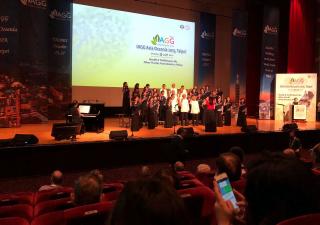Participation and learning: Taipei Gerontology and Geriatrics Asia/Oceania Regional Congress, 23-26 October 2019, by Brian Findsen. An article on the topic of "Later Life Learning", published in PIMA Bulletin, Number 27.
Having retired from the University of Waikato in New Zealand in July, I have been working on an occasional basis in Chiayi, Taiwan, for the National Chung Cheng (CCU) University (Department of Adult & Continuing Education), so I deliberately linked chronologically this regional congress on “most things gerontological” to my work further south in Taiwan (Chiayi). I had previously participated in similar congresses of the International Association of Gerontology and Geriatrics (IAGG) in Melbourne, Chiang Mai and San Francisco (World Congress). I have learned to appreciate the diversity of topics but not expect too much in terms of critical analysis of gerontology issues. This proved to be the case. In any event, according to organizers, there were over 3,000 participants, most within the region, especially Taiwan, but some outside (e.g. Finland).
The central theme for the Congress was “Health and Well-Being in the Silver World: from Bench to Policy”. Given that the overall event occurred over four days, I was selective in what I attended. The opening ceremony had some flair, supported by a local choir. The Taiwanese like to complement intellectual events with cultural (see photo), a trend I have come to appreciate. Many of the topics in the Congress reflected current pre-occupations with medical advancements, technological and AI applications for elders, retirement and employment issues, care for “the elderly”, and cognitive frailty (including dementia).
My own bias in attending sessions, without ignoring other orientations, was in the track of the Behavioral and Social Sciences. This included my own submitted symposium on “Learning in later life and Active Engagement across Nations”. Co-presenters were Fang-Mien (Agnes) Liao, a PhD student in the Department at CCU, on “Views of retired University male teachers: Between imagination and action’’ and Gillian Boulton-Lewis (Queensland, Australia) on ‘”Age, Exercise and Motivation for Engagement”. Both topics had poignancy for my newly “retired” self! I presented on “Promoting Health and Well-Being for New Zealand Seniors: A case of a complementary provision for Pākēka and Māori in an urban environment”. I have had continuing involvement over several years with both the agencies that I discussed in my presentation: Age Concern Hamilton, and the Rauawaawa Kaumātua Trust. A fuller rendition of my presentation in published form is available in Fresh perspectives on Older Adult Education (2019) which I edited, or previously in a 2016 issue of the International Journal of Lifelong Education.
Among the diverse topics for keynote speeches, I had a special interest in what well-known American gerontologist, John Rowe, had to say in his presentation “Multi-dimensional comparison of countries’ adaptation to society aging (Policy, Planning and Practice)”. With his colleagues, John was using the Hartford Aging Index from 18 OECD countries to gather data on the following issues: Productivity and Engagement; Well-Being; Equity (haves versus haves-not among elders); Cohesion (tension/collaboration across generations); Security (physical and financial). Within the first of these, further measures have included labor force engagement, retirement age, volunteering and retraining (non-formal education). I was pleasantly surprised that non-formal education had been included, given that this has been seldom recognized in considering ‘engagement’ in the past.
Among his varied observations, John identified the retirement age for marginalized older adults as a developing social issue. I agreed with this analysis, especially because in New Zealand universal superannuation is available at age 65, but significant numbers of marginalized seniors (e.g. older Maori) do not make it to this age of eligibility. While most countries including New Zealand are contemplating raising the age of eligibility for a pension, this point of apportioning a pension to sub-groups according to a different formula, contradicts the trend.
The Active Aging Consortium in Asia Pacific (ACAP), of which I am a member, also had a few presentations at the congress related to work and retirement in Hong Kong, South Korea and the USA. It appears that the common national-level issues of increasing life expectancy, (early) retirement for some, pension eligibility (if applicable), concern for continuing work opportunities, volunteering and governmental policies do not have tight borders. I am grateful for membership of ACAP, and the continuing sharing of ideas across countries about active ageing and lifelong learning in the region where I live.
Another aspect of the Congress was the posters presented in a public space which changed throughout the congress. Some of these had wide applications. Others were more specifically channeled to issues in a particular country/region, such as being prone to flooding, and motorcyclist accidents. I was absolutely amazed at the variety of research presented and took many photographs. Included in these poster presentations were topics such as:
- Filial piety and later life care arrangements among Asians in New Zealand: Adult children’s perspectives;
- Housing flood resilience for seniors (Taiwan);
- Investigating older adults’ technological needs and social activities (Taiwan);
- A review of literature for reminiscence with music (South Korea);
- An analysis of the elder motorcyclist crashes in Taiwan;
- Communicating with ethnic minorities; elderly in long-term care: challenges among health care staff in Japan;
- Effects on patients with dementia participating in inter-generational activities on quality of life and depression Mainland China).
I remain fundamentally a specialist in later life learning (educational gerontology) but continue to conceptualise developments in this domain from a wide theoretical framework. Congresses of the type in Taipei help me to keep updated and relevant.
Asics footwear | Archives des Sneakers- Log in to post comments














Latest Comments